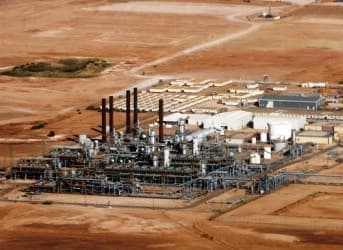The attack on BP-operated Amenas gas facilities in the Algerian Sahara was a spectacular lesson for the energy industry: No amount of high-tech security is invulnerable to Sahelian militants.
Billions will now be spent on securing Western energy interests across the region and investment will take a hit at a time when the big news was that the industry’s junior players—particularly American and Canadian—were growing ever so bold and willing to take risks in unstable regions. Their markets may not be able to sustain this bravery much longer.
An exodus—or relocation—of Western energy industry workers got underway immediately, not only in Algeria.
Not only will security costs rise; so will insurance premiums along with the cost of relocating personnel. Projects will be delayed, and production will take a small hit, but this will be only temporary.
Related Article: Why This is All Libya's Fault
While this incident will boost business in a big way for providers of physical and technical security, this will be money misplaced, and misspent. Amenas’ security was said to be stronger than an army barracks. What foreign oil and gas companies really need is the kind of strategic security analysis that is hard to come by, and that US agencies, for instance, don’t have themselves.
The biggest mistake the industry makes is to ignore regional and geopolitical dynamics. It’s complicated, and the corporate world doesn’t have the patience for it. But what has happened in the Sahel since the Western intervention in Libya is the stuff of geopolitical analysis, and while it would have been difficult to predict the attack on Amenas because it was less about events in Mali than it was about an internecine struggle for the leadership throne of Sahelian jihad, it was easy to predict an urgent security situation from Libya across the Sahel and all the way to Syria.
But while the security focus is most extensively right now on Algeria, the choice of the Algerian gas field as a target had nothing to do with Algeria or its energy industry. Algeria is much more secure, and its security forces much more capable, than its Sahelian neighbors.
Key to assessing the real security risk to Western energy firms is understanding why the BP field was chosen as a target. The short answer is this: There are two key figures running Islamic jihad operations in the Sahel and they are vying for power after a leadership dispute. The group that launched the attack on Amenas chose Algeria because of geography (Amenas is in the desert and easily accessible from the Libyan border, 100 kilometers away) and because this is the rival jihadist leaders’ stomping ground. While the attack fit the overall Islamist agenda of sending France a message about its intervention in Mali, the intent was to send a bigger message to the group’s rival jihadist leadership.
Related Article: Algeria Hostage Crisis - Look to Mali for Answers
It was an amazingly spectacular attack that netted some 700 hostages. None of the hostages were executed, and the 30 or so who died were killed in the Algerian Special Forces rescue operation. The attackers also made no attempt to destroy or sabotage the gas facilities. This was an extremely high-profile publicity stunt that serves as the calling card of a specific individual, Mokhtar Belmokhtar. The message was that under his leadership, the jihadists have massive capabilities. Belmokhtar’s leadership rival, Abdelmalek Droukdel, will have to respond to this challenge with an equally spectacular attack. It is not likely to be Algeria.
The energy industry’s biggest security concerns right now should be Niger, the home of France’s massive Areva uranium interests, and Libya, already destabilized. In both places, security is easily infiltrated. In Libya, security is provided by roving militias whose loyalty is at best questionable. Those loyalties could easily shift as militants move across the border from Mali into Libya. In Niger, the weak structure of government and the rampant corruption of security forces means that security is extremely vulnerable.
ADVERTISEMENT
The markets—like the industry—do not respond to complicated geopolitics. They respond to specific incidents and there will be another one. That is to say, the markets will not take the Algerian incident as seriously as it should.
By. Charles Kennedy of Oilprice.com



















Great article and a couple of observations:
Firstly, what high tech solutions/systems? I think you make a valid point but even more to the point how much would you have needed to defeat the threat?
Secondly, Mali was a convenient excuse.
Some interesting analysis here: http://tiny.cc/algeria
The lesson learned is not that "jihadists have massive capabilities" but rather that jihadi terrorist bands are helpless against prompt application of overwhelming military force.